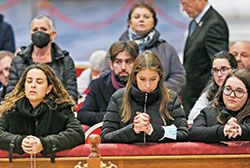A Pilgrimage of Faith / Daniel Conway
Pope’s death leads to a solemn, simple pilgrimage of respect

People pay their respects at the body of Pope Benedict XVI in St. Peter’s Basilica at the Vatican on Jan. 3. (CNS photo/Paul Haring)
(Editor’s note: Daniel Conway is a member of The Criterion’s editorial committee. He travelled to Rome and the Vatican to cover Pope Emeritus Benedict XVI’s funeral. Below is a reflection he wrote en route to Italy. Read a reflection he wrote while in Rome and at the Vatican covering Pope Emeritus Benedict XVI’s funeral.)
By Daniel Conway (Special to The Criterion)
On Tuesday, Jan. 3, I began a journey to Rome and to Vatican City to report on the funeral of Pope Benedict XVI
and to pay my respects to Joseph Ratzinger, a man who has been my spiritual father for nearly 50 years.
We had been told that, as the former pope requested, the funeral will be “solemn and simple.” This is, in a way, a summary of Joseph Ratzinger’s life and teaching. Solemnity (reverence) is the only appropriate response to the presence of God. Simplicity speaks to the virtues of humility, compassion and service.
Pope Benedict was a reverent man who lived a simple life even when he held powerful positions in the “institutional” Church. He loved God, and he served his sisters and brothers. Everything else was secondary.
Pope Benedict insisted that God always be at the center of our minds and hearts. Unless everything we say and do brings us closer to God, we lose our focus and stray from the right path.
I first encountered the teaching of Joseph Ratzinger when I was studying theology at Saint Meinrad Seminary and School of Theology in St. Meinrad in the mid-1970s.
His Introduction to Christianity had a profound impact on me as a young man. It not only opened my mind (with great clarity and simplicity) to the essential teaching and practice of the Catholic Church, but it touched my heart.
I had never before read a textbook on theology—or any other subject—that so engaged me personally or moved me spiritually, but Ratzinger’s love for the Church and for her teachings was so powerful that I couldn’t keep a safe distance from what I was reading. Most importantly, what this brilliant man had to say was clearly imbued with his reverent love for his Lord, Jesus Christ.
Ratzinger’s love was contagious. As a result, I have continued to read his writing eagerly, with deep respect, throughout the many changes in his life—from professor, to bishop, to cardinal, to pope, and to the first emeritus pope in hundreds of years!
My life has changed, too, in the past four decades—from husband, father and grandfather to development professional, stewardship educator and consultant, and in these last years to freelance writer and communications professional. Joseph Ratzinger has accompanied me on every stage of my life’s journey. How could I pass up the opportunity to join with millions of others in bidding him a solemn and simple farewell?
As I travelled to Rome, I couldn’t help thinking about the many things my spiritual father has taught me—and the rest of his millions of students—through the years. Here are just some of the things that stand out for me:
• Jesus is Lord not only of the vast universe, but of my life. A personal encounter (friendship) with Jesus is the goal of my work and of my life.
• All of sacred Scripture should be read with Jesus Christ in mind. Yes, there are many books, many diverse voices, that speak to us in the Bible, but the primary author is the Holy Spirit. If we listen prayerfully, he reveals to us who Jesus is and who we are.
• Christianity is not ideology or ethics or even religion (understood as mere religiosity or piety). It is communion with God in Christ, participation in his mystical body, the Church. The Church is not perfect, because we are not perfect, but she is perfect in her Lord who renews and redirects his Church constantly through the Holy Spirit and the intercession of Mary and all the saints.
• Vatican II did not break with the past. It renewed the Church in continuity with the past, correcting abuses and undue rigidity, establishing a spiritual dynamic (the work of the Holy Spirit) that is intended to carry forward the Church’s mission in the world. Those who only look backward miss the excitement and hope that the Council infused in the too often stagnant teaching, liturgy and ministry of the pre-Vatican II Church. Those who only look to the “now” or to an idealized future are cut off from the richness and the wisdom of all that came before. Jesus Christ is the same—yesterday, today and always. He is the Alpha and the Omega—the beginning and the end—of all God’s Creation.
The pope emeritus, whom I travelled to Rome to bid farewell, has entered into his final journey—a synodal experience that he shares with countless others in the communion of saints. May the angels welcome him into the heavenly Jerusalem that was (and is) the goal of his personal pilgrimage through death to eternal life. †
See all our coverage of the death of Pope Emeritus Benedict XVI
